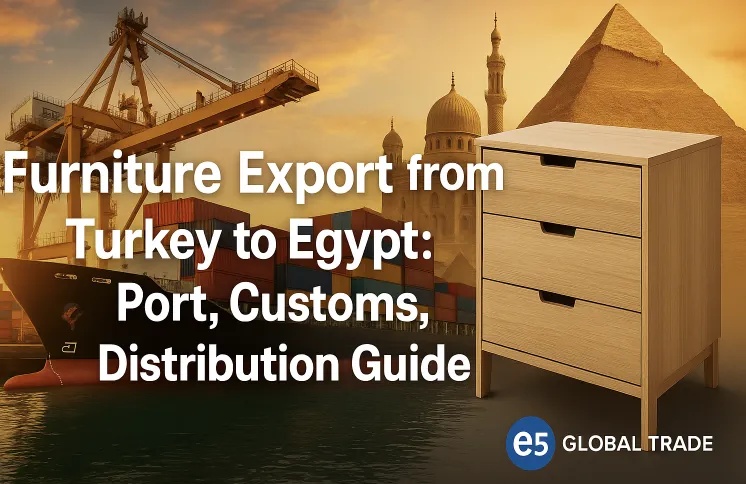For manufacturers wishing to export furniture from Turkey to Egypt, the process can be completed quickly and cost-effectively with accurate information and planning. Egypt is a large market with a population exceeding 105 million, and the Cairo-Alexandria and New Capital projects, in particular, are increasing furniture demand. The export process is shaped by port procedures and customs regulations and the distribution network. The first step is to complete the procedures on the Turkish side. Exporters must prepare the following documents: Certificate of Origin: A certificate of origin approved by the Turkish Ministry of Commerce or the relevant chamber of commerce must be obtained. This document proves that the product was produced in Turkey and is mandatory at Egyptian customs. Commercial Invoice: The invoice must include the product name, quantity, unit price, total amount, payment terms, delivery method, INCOTERMS, and buyer-seller information in English. Packing List: The number of boxes, gross net weight, dimensions, and the contents of each box should be listed in detail. The number of pieces, especially for flat-packaged products, must be recorded accurately. Transport Document: For sea shipments, the original bill of lading (BOL) is issued. If air transportation is used, an airway bill (AWB) is sufficient. Customs Declaration: The exporter or customs consultant submits a customs declaration in Turkey, ensuring the product's release into free circulation. Transport from Turkey to Egypt is generally carried out by sea. The most preferred ports are: Alexandria Port, located in Alexandria, where most containers arriving from Turkey arrive. The port's infrastructure is robust, and customs procedures are generally completed within 3-5 business days. Adabi Port, closer to Cairo, is preferred for inland distribution. However, congestion can occur at times. Port Said Port, opening to the Eastern Mediterranean, is used primarily on routes between Asia and Europe. It can also be an alternative for containers arriving from Turkey. Egyptian customs procedures are quite rigorous. The following steps are followed: Customs Value and Tax Calculation: Customs duty is calculated based on the invoice value of the product. The basic customs duty on furniture products ranges from 5% to 15%. Value-added tax (VAT) is applied at a rate of 14%. In some special cases, additional duties or anti-dumping duties may be imposed. Document Control: Egyptian Customs checks the certificate of origin, commercial invoice, packing list, and transport documents. The processing time is extended if documents are missing. Physical Inspection: Containers may be opened and inspected randomly or based on a risk analysis. The product's packaging, materials, and labeling are checked. Arabic Label Requirement: All furniture products are required to have Arabic labels on their packaging. The product name, material information, assembly instructions, safety warnings, maintenance recommendations, and manufacturer information must be included. If this label is not present, the product may be temporarily rejected or corrections may be requested. Test Reports: Egyptian Customs generally does not request test reports, but the buyer or project manager may request a BS 5852 hygienic surface or material report, specifically a flame retardancy test. In this case, reports must be obtained from internationally recognized laboratories. The product, which has cleared customs, is delivered to the buyer's warehouse or distribution center. Distribution Channels: Local Distributors: Partnering with furniture distributors operating in Egypt is the most common method. For example, companies like Al Fares Furniture, Cairo Interiors, and Egyptian Home are major buyers. Retail Chains: Chains like Carrefour Egypt, Lulu Hypermarket, Spinneys, and Jazar Market sell Turkish products in their furniture sections. Turkish Food and Furniture Stores: Turkish stores are increasing in Cairo, Alexandria, and Giza. These stores can import directly or purchase from local distributors. E-Commerce Platforms: Online sales are increasing through platforms like Jumia.eg, Amazon.eg, and Otlob. Some manufacturers ship products directly to these platforms. Tip: Exporters can expedite the process by working with a local customs broker or logistics partner in Egypt. This partner will pre-check the documents, manage customs procedures, and support the distribution network. Consequently, when exporting furniture from Turkey to Egypt, proper management of port customs and distribution processes is crucial. Proper documentation, Arabic labeling, and collaboration with a local partner will ensure smooth processing. When these steps are implemented correctly, exports become profitable and sustainable.
E5 Global Trade | Yazılar
Furniture exports from Turkey to Egypt: Port, customs, distribution guide
Küresel Haber Ajansı
·


